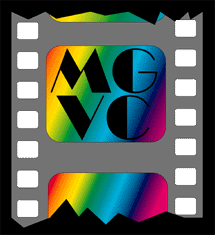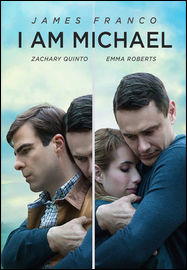(2016, 98 min)
Country: U. S.
Director: Justin Kelly
Studio: Passion River
Language: English
SYNOPSIS: I Am Michael is the incredible true-life story of Michael Glatze (James Franco), a high profile gay youth activist who created a national controversy when he claimed to no longer be gay and became a straight Christian pastor. The film follows Michael from his life in San Francisco with his boyfriend Bennett (Zachary Quinto), where he pursues political activism, a journalist career at XY Magazine, social awareness and sexual exploration, to his days of personal self-discovery.
After a traumatic scare, Michael is plagued by doubt and paranoia, and begins a religious reawakening. Michael renounces his gay lifestyle, rejects his friends, and endeavors to find his "true self." He explores Buddhism and Mormonism, yet ultimately lands at a Christian Bible school in rural Wyoming where he meets his girlfriend, Rebekah (Emma Roberts), and becomes the pastor of his own church. This powerful new film captures one man's haunting journey through modern concepts of love, denial and redemption.
James Franco’s ongoing game of sexual-identity peekaboo gets its most provocative jolt yet from I Am Michael, a remarkably even-handed account of outspoken gay-rights journalist Michael Glatze’s 180-degree identity reversal, which shocked friends and admirers after he found religion, rejected his queer “lifestyle” and became a Christian pastor. While admirable in its seeming impartiality, Justin Kelly’s hot-potato directorial debut won’t be seen by many beyond the arthouse and festival circuit, but it will nevertheless rile viewers and provoke discussion on all sides, simply because it cuts to the heart of the self-doubt, fear and prejudice associated with modern homosexuality.
REVIEW:
Coming out is a complicated process, and it probably would have made sense to start “I Am Michael" there — not at the moment Michael realized he was gay, but rather with his personal coming-out story, which nearly all gay men of a certain generation tell and retell. It’s a rite of passage to which heterosexuals don’t really relate, since at no point in their lives are straight men or women expected to declare their persuasion. For gay men, however, sharing this moment of self-liberation is a way of bonding with others — and potentially, a way of connecting with audiences, too.
“I Am Michael” may as well be another type of coming-out story, one that virtually never gets told in movies, as an initially skeptical individual is born again as a fundamentalist Christian — a journey that, in Michael’s case, comes with the same interior conflict and shame that announcing himself as gay did nearly a decade earlier. This, of course, is what Franco’s character goes through in the film, though audiences will surely have their own set of complex reactions to his situation, particularly those who see Glatze’s choice not only as a betrayal of his true self, but also an attack on all who have found peace with their homosexuality.
Kelly clearly wants to be as fair as possible to the facts, which found their way to him via executive producer Gus Van Sant. The “Milk” director had read a story in the New York Times called “My Ex-Gay Friend,” written by Benoit Denizet-Lewis, one of Glatze’s former colleagues at XY magazine. The world is full of stories of young people who have gone through anti-gay conversion (or “reparative”) therapy, though Glatze’s case is unique in that he had been a vocal activist for gay teens, serving as managing editor of XY as a means of reaching other confused young men who might otherwise be depressed or suicidal without positive gay imagery and role models.
Whereas many kids have forced their same-sex temptations back into the closet for fear of being damned to hell, Kelly’s screenplay (co-written with Stacey Miller) suggests that Michael was driven by a profound desire to reach heaven. Without reducing Michael’s process to a single “eureka” moment, the matter-of-factly constructed script suggests that the decision arose in response to a series of prompts: Early on, what looks like a healthy relationship with b.f. Bennett (Zachary Quinto) shifts into a trickier three-way arrangement with cute college kid Tyler (Charlie Carver). While slowly withdrawing from gay gatherings and clubs, Michael begins to dwell on having missed his mother’s death, speculating about whether he will be reunited with her in the afterlife. Shortly thereafter, Michael interprets a wave of intense panic attacks as a more serious medical condition, crediting his survival to a divine plan.
For the sake of visualization, Kelly shows Michael drawing endless spirals as these thoughts crowd his mind, but in fact, part of what made Glatze’s change so frustrating to friends was the fact that he had always been the most intellectual staff member, during his San Francisco tenure at XY, and later at the Halifax, Canada- based YGA magazine. He was a voraciously curious queer-theory expert capable of arguing questions of identity and desire from a rational, well-read position. Suddenly, he found himself studying the Bible with the same intensity, seizing on Matthew 10:39 as a kind of justification to deny that aspect of his life that had previously defined him — which would be one thing, if he didn’t also denounce homosexuality as an invented, “abnormal” identity and begin counseling troubled teens to that effect.
Whereas Denizet-Lewis’ story skeptically recapped Glatze’s transformation from the sidelines, “I Am Michael” aligns itself directly with the character, trying its best to get inside his head. Naturally, we still sense the disbelief from Bennett, Tyler and a handsome Buddhist named Nico (Avan Jogia) whom he uses along the way, though for the most part, the film is single-mindedly focused on Michael’s journey — to the exclusion of other subplots or business that might have made for a richer film.
Except for the 2007-set opening scene, events unfold in strict chronological order as Michael progressively reinvents himself for the second time. That evolution can be felt most clearly through the shifting score, from Scissor Sisters lead Jake Shears and pianist Tim Kvasnosky, as it settles from early synth riffs down to more classical-sounding compositions.
Still, some things simply do not change with Michael, including his underlying evangelical instinct: It’s not enough for Michael to figure out his own identity; he is compelled to sway others to his philosophy along the way, even when his custom-tailored Christian beliefs get him kicked out of a Wyoming Bible school — but not before meeting a naive young lady, Rebekah (Emma Roberts), flexible enough to accept his past.
With any actor other in the lead, “I Am Michael” would have been a completely different beast entirely, in light of Franco’s willingness to invite speculation into his own sexual proclivities (most cleverly addressed in “The Interview’s” faux outing of Eminem, in which the good-humored rapper may as well be speaking for Franco when he confesses, “I’ve basically been leaving a trail of gay breadcrumbs”). On one hand, what Franco does with his private life remains a tiresome and irrelevant distraction from the quality of the work itself, and yet, the seemingly omnipresent actor seems to be orchestrating some sort of massive performance-art project around the very question of his identity, into which questions of sexuality clearly factor.
Here, he gamely commits to the full spectrum the role demands, ranging from casual canoodling with Quinto in the couple’s San Francisco apartment to the hesitant first steps to (re)claiming Michael’s straight identity. As if determined not to offend, yet equally committed not to shy away from sexuality, Kelly includes footage of the initial threesome involving Michael, Bennett and Tyler, but shoots it at such a distance that it hardly registers as arousing.
That clinical, kid-gloves approach extends to the entire film, which manages to re-create a late-’90s rave and other period details on its modest budget, but always at arm’s length. Shooting in inexplicably dark widescreen, but seldom taking advantage of that cinematic format’s compositional potential, Kelly’s approach registers as cold and almost TV-movie-ish at times, as if he’s subtracted his own artistic take in order to maintain that semblance of objectivity. Except for the uneasy last shot and the heartbreaking phone call between Franco and Quinto that precedes it, one might not even realize a gay man had made the film. But then, the impulse to affix such labels seems to have been what got Michael into this fix in the first place.
-- Peter Debruge, Variety (http://www.variety.com/)




